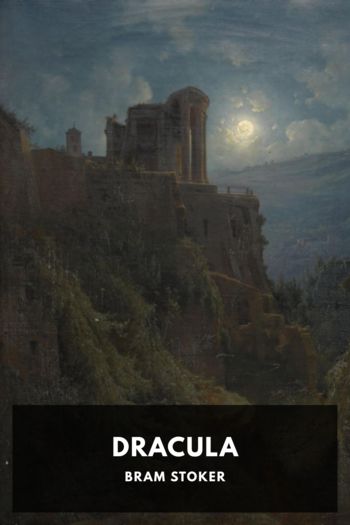Dracula by Bram Stoker (readnow TXT) 📕

Description
Dracula is one of the most famous public-domain horror novels in existence, responsible not just for introducing the eponymous Count Dracula, but for introducing many of the common tropes we see in modern horror fiction.
Count Dracula isn’t the first vampire to have graced the pages of literature—that honor is thought to belong to Lord Ruthven in The Vampyr, by John William Polidori—but Dracula is the vampire on which modern vampires are based.
Dracula wasn’t as famous in its day as it is today; readers of the time seemed to enjoy it as nothing more than a good story, and Stoker died nearly penniless. But its long-lasting influence is undeniable, and for all its age Dracula remains a gripping, fast-paced, and enjoyable read.
Read free book «Dracula by Bram Stoker (readnow TXT) 📕» - read online or download for free at americanlibrarybooks.com
- Author: Bram Stoker
Read book online «Dracula by Bram Stoker (readnow TXT) 📕». Author - Bram Stoker
“I hope,” said Van Helsing, “that when you are sending the child home you will caution its parents to keep strict watch over it. These fancies to stray are most dangerous; and if the child were to remain out another night, it would probably be fatal. But in any case I suppose you will not let it away for some days?”
“Certainly not, not for a week at least; longer if the wound is not healed.”
Our visit to the hospital took more time than we had reckoned on, and the sun had dipped before we came out. When Van Helsing saw how dark it was, he said:—
“There is no hurry. It is more late than I thought. Come, let us seek somewhere that we may eat, and then we shall go on our way.”
We dined at Jack Straw’s Castle along with a little crowd of bicyclists and others who were genially noisy. About ten o’clock we started from the inn. It was then very dark, and the scattered lamps made the darkness greater when we were once outside their individual radius. The Professor had evidently noted the road we were to go, for he went on unhesitatingly; but, as for me, I was in quite a mixup as to locality. As we went further, we met fewer and fewer people, till at last we were somewhat surprised when we met even the patrol of horse police going their usual suburban round. At last we reached the wall of the churchyard, which we climbed over. With some little difficulty—for it was very dark, and the whole place seemed so strange to us—we found the Westenra tomb. The Professor took the key, opened the creaky door, and standing back, politely, but quite unconsciously, motioned me to precede him. There was a delicious irony in the offer, in the courtliness of giving preference on such a ghastly occasion. My companion followed me quickly, and cautiously drew the door to, after carefully ascertaining that the lock was a falling, and not a spring, one. In the latter case we should have been in a bad plight. Then he fumbled in his bag, and taking out a matchbox and a piece of candle, proceeded to make a light. The tomb in the daytime, and when wreathed with fresh flowers, had looked grim and gruesome enough; but now, some days afterwards, when the flowers hung lank and dead, their whites turning to rust and their greens to browns; when the spider and the beetle had resumed their accustomed dominance; when time-discoloured stone, and dust-encrusted mortar, and rusty, dank iron, and tarnished brass, and clouded silver-plating gave back the feeble glimmer of a candle, the effect was more miserable and sordid than could have been imagined. It conveyed irresistibly the idea that life—animal life—was not the only thing which could pass away.
Van Helsing went about his work systematically. Holding his candle so that he could read the coffin plates, and so holding it that the sperm dropped in white patches which congealed as they touched the metal, he made assurance of Lucy’s coffin. Another search in his bag, and he took out a turnscrew.
“What are you going to do?” I asked.
“To open the coffin. You shall yet be convinced.” Straightway he began taking out the screws, and finally lifted off the lid, showing the casing of lead beneath. The sight was almost too much for me. It seemed to be as much an affront to the dead as it would have been to have stripped off her clothing in her sleep whilst living; I actually took hold of his hand to stop him. He only said: “You shall see,” and again fumbling in his bag, took out a tiny fretsaw. Striking the turnscrew through the lead with a swift downward stab, which made me wince, he made a small hole, which was, however, big enough to admit the point of the saw. I had expected a rush of gas from the week-old corpse. We doctors, who have had to study our dangers, have to become accustomed to such things, and I drew back towards the door. But the Professor never stopped for a moment; he sawed down a couple of feet along one side of the lead coffin, and then across, and down the other side. Taking the edge of the loose flange, he bent it back towards the foot of the coffin, and holding up the candle into the





Comments (0)